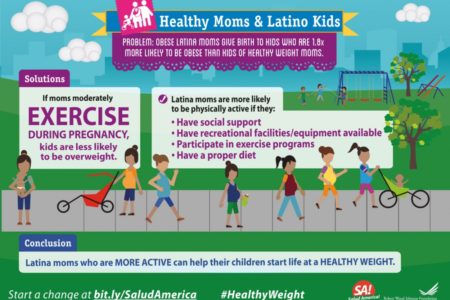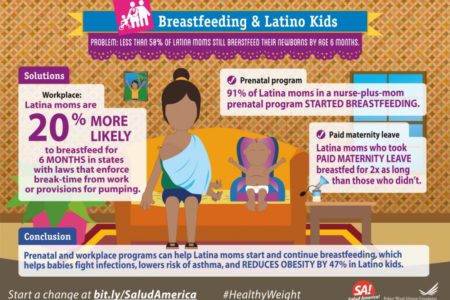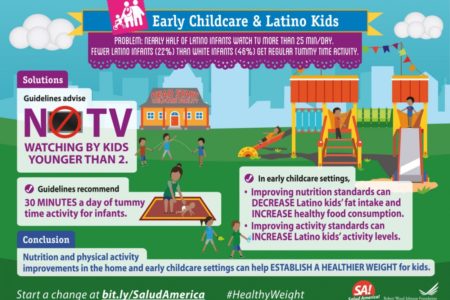Share On Social!
Abstract
One of four U.S. kids is already overweight or obese by age 2-5, with a higher prevalence among Latino kids (30%) than white kids (21%).
How can we promote a healthy weight by kindergarten?
Mothers’ physical activity and healthy eating habits before and during pregnancy play a big role.
Breastfeeding also has many positive effects on children. Interventions or policies aimed at improving breastfeeding rates, while reducing formula marketing, among Latina mothers may be critical to promoting healthy weight goals.
Healthy eating and physical activity habits established during early childhood care settings also is a stepping stone toward lifelong health.
Read the Issue Brief in English (PDF)
Read the Issue Brief in Spanish (PDF)
Contents
Introduction & Methods. This Salud America! research review is an assessment of available research on factors affecting obesity rates among Latino youth children younger than age 5 and interventions or policies that may help these children to achieve a healthy weight prior to entering kindergarten.
Key Research Findings

Maternal obesity. Obese Latina moms give birth to kids who are 1.8 times more likely to be obese than kids of healthy weight moms.
Breastfeeding and Latino children. Less than 50% of Latina moms still breastfeed their newborns by age 6 months. Breastfeeding for 1 year or more resulted in a 47% reduction in obesity rates among Latino kids, and significantly protected kids from becoming obese through age 4, studies found. Breastfeeding also contains nutrients for proper infant development, reduces risk of asthma or allergies, and helps fight off viruses and bacteria. It also has been linked to higher IQ scores in later childhood.

Breastfeeding and paid maternity leave, prenatal education, and workplace initiatives. Latina moms who took paid maternity leave breastfed for 2x times as long than those who didn’t. Latina moms are 20% more likely to breastfeed for 6 months in states with laws that enforce break-time from work or provisions for pumping. More than 90% of Latina moms in a nurse-plus-mom prenatal program started breastfeeding.
Marketing of infant formula. Women reported that formula marketing decreased confidence in a mother’s ability to breastfeed, especially when supplied by healthcare practitioners/practices. Breastfeeding initiation and duration are improved for babies born in hospitals that participate in WHO’s Baby Friendly Hospital Initiative, which promotes breastfeeding and deemphasizes formula.

Latino infant eating and activity habits patterns. Nearly half of Latino infants watch TV more than 25 minutes a day. Fewer Latino infants (22%) than white infants (46%) get regular tummy time physical activity.
Early childcare settings. In early childcare settings, improving nutrition standards can decrease Latino Latino kids’ fat intake and increase healthy food consumption. Improving activity standards can increase Latino kids’ activity levels.
Conclusions
Policy Implications. Policymakers and advocates should promote breastfeeding via formula marketing reduction, paid maternity leave, and break time or private places to express milk at work. Policymakers also should enforce healthier eating and physical activity standards in early child care centers, while childcare providers should comply. Providers should use culturally tailored prenatal programs to promote breastfeeding, maternal healthy lifestyles, and proper infant feeding habits among Latinas.
Future Research Needs. Policies and programs working to promote prenatal education, breastfeeding, paid maternity leave, and healthier lifestyles among general-population mothers and children ages 0-5 should be more directly investigated in Latino populations. This would provide further clinical evidence that these approaches are capable of affecting positive changes in childhood obesity endpoints in Latino infants and preschool-aged children.
References
See the Full Research Review with references (PDF)
About the Authors
- Amelie G. Ramirez, Dr.P.H., Director, Salud America!, Professor, Institute for Health Promotion Research, UT Health San Antonio
- Kipling J. Gallion, M.A., Deputy Director, Salud America!, Assistant Professor, Institute for Health Promotion Research, UT Health San Antonio
- Lauren Mays Weddle, PhD, Mays Ink Medical Writing, LLC
This report is copyright 2017 RWJF, Route 1 and College Road, P.O. Box 2316, Princeton, NJ, 08543-2316, www.rwjf.org.
Explore More:
Healthy Families & SchoolsBy The Numbers
142
Percent
Expected rise in Latino cancer cases in coming years



